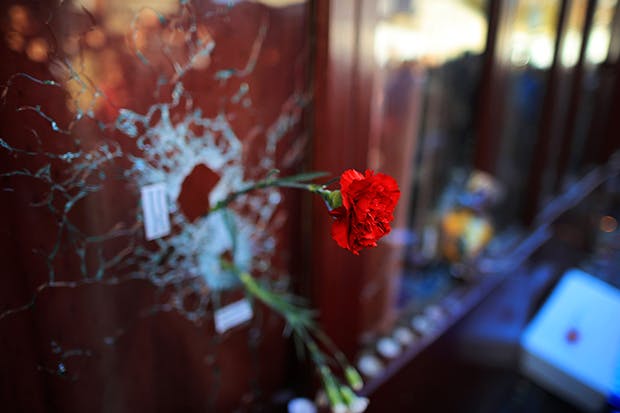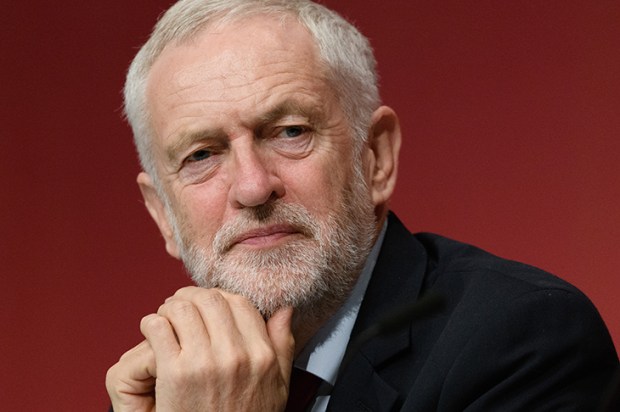The Archbishop of Canterbury, we heard during the BBC’s Songs of Praise broadcast last Sunday, ‘doubted God’ after the Paris attacks. On a walk on Saturday (he told listeners) he said to God, ‘Where are you in all this?’
As we are in confessional mood, here’s an anxiety of my own. The Paris atrocity has not occasioned me any new doubts, but Justin Welby’s remarks have caused me to doubt Archbishop Welby. Speaking on behalf of God, I have to ask the Archbishop: ‘Justin, where are you in all this?’
I’m not a believer, but I try to understand what believers believe. Christian theology has a long and distinguished intellectual history; faith’s most difficult conundrums have all been raised and answers (acceptable or otherwise) have been offered to all the obvious questions.
Foremost among these is the mystery of evil. Like (I guess) any child, I was struck early by the spiritual puzzle that anyone following the Christian faith must grapple with: the problem of human cruelty, misery, and pain. If God is all-knowing and all-powerful, why does He let bad things happen?
Zoroastrians, Cathars and (from their language) some Muslims have had their own answer known as dualism: a universe dominated by two great powers, God and Satan, locked in perpetual battle. We are enjoined to enlist on the side of God, but the fortunes of war will ebb and flow, and both sides suffer victories and defeats. Nothing in dualist teaching claims that terrible things will not happen — to us, to those we love, or to the world. But we know which side we’re on, and we will be rewarded in the afterlife for putting on the whole armour of God.
Archbishop Welby would find no theological problem about the Paris atrocities if he were a dualist. A horrifying setback for light can only strengthen a dualist’s determination to fight harder against darkness. Celestial as well as civil powers can invoke the spirit of the Blitz, and in recent days many Christians will have responded to terrorist horrors with an invigorated, not diminished, faith. And it will at once be apparent to you that these Christians’ belief embraces a strong strain of dualism: ‘Onward Christian soldiers/Marching as to war’ and all that.
There is some authority for this in the Gospels, depending on how you choose to read them. But authoritative Christian teaching has tended to reject as a heresy the dualistic (or Manichean) conception. The preferred view is that God is omnipotent, that even Satan is ultimately beneath His command, but that He moves in mysterious ways and it may not be given to us to understand why — as it were — He lets Satan survive and evil prosper.
Some theologians, however, have essayed a possible reason for the existence in God’s universe of evil, cruelty and pain. It is that God has given us free will and wants us to choose. We must encounter things that test us but we have His commandments and He will not force our hand. We must embrace Him willingly. According to this view, good can only truly exist if there is evil too, and we can choose good. When Adam and Eve were expelled from the Garden of Eden they were given the knowledge of good and evil, and (some who hold this view deduce) that is why even the serpent and the apple were part of God’s plan. Loving parents do sometimes stand back while their children learn about error or calamity the hard way.
If the Archbishop subscribed to this view then, though the Paris massacre might have shocked us by the sheer scale of the wickedness God has ‘allowed’ in His universe and the pain He has permitted innocent people to suffer, Archbishop Welby, after wincing, should have been able to reconcile the awful news with both his faith, and the ultimate benevolence of his deity. The Catholic explanation for a catastrophic earthquake in Lisbon — that all was ‘all for the best in this best possible of worlds’ — though mocked cheaply by Voltaire, is actually profound and should be enough for anyone sure that God’s in his Heaven and this must be the best possible of all worlds.
But the Archbishop struggles. Why? I can only conclude that (as he has sometimes hinted) his belief in the very existence of a deity can falter. After all, if one starts from an absolute faith that there is a benevolent God, one must simply find ways to explain or discount apparently awkward evidence — of which the problem of pain is an obvious example. If, on the other hand, one is unsure about the existence of God, one does not seek to discount troubling evidence against the theory, but approaches it with an open mind.
I suspect that describes Archbishop Welby. If so, we should not reproach him for responding to an act of great wickedness as he did — though we might enquire whether it was really a good idea to be Archbishop of Canterbury. But what I must reproach him for is this: Paris is now, close to home, and once Welby’s own home, but why should that make the atrocity any more philosophically troubling than a Lisbon earthquake centuries ago? I feel a righteous anger against people who renounce their faith because their aunt died of cancer. Other people’s aunts die of cancer all the time. ‘Why us? Why me? Why now?’ should carry no more force than ‘Why others? Why then?’
The Archbishop’s response was doubtless human, but theologically shallow. Jesus, in His agony (‘My God, my God, why hast Thou forsaken me?) doubted Himself, not God. Straining his ears on last Saturday’s walk, the Archbishop might have heard a rumble from the sky: ‘My Canterbury, my Canterbury, why has thou forsaken me?
UPDATE The Archbishop has written a blog with own explanation of his remarks.
Got something to add? Join the discussion and comment below.
Get 10 issues for just $10
Subscribe to The Spectator Australia today for the next 10 magazine issues, plus full online access, for just $10.















Comments
Don't miss out
Join the conversation with other Spectator Australia readers. Subscribe to leave a comment.
SUBSCRIBEAlready a subscriber? Log in